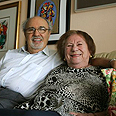
Publication of disputed Holocaust memoir canceled
Publishing house forced to cancel publication of Holocaust memoir after it turns out author made up details regarding love story in book. Scholars, family members worry fabrication might encourage Holocaust deniers
The publisher of a disputed Holocaust memoir has canceled the book, adding the name Herman Rosenblat to an increasingly long line of literary fakers and ending with a heartbreaking crash his story — embraced by Oprah Winfrey among others — of meeting his future wife at a Nazi concentration camp.
"I wanted to bring happiness to people," Rosenblat said in a statement issued Saturday through his agent, Andrea Hurst. "I brought hope to a lot of people. My motivation was to make good in this world."
Rosenblat's "Angel at the Fence" had been scheduled to come out in February, but Berkley Books, an imprint of Penguin Group (USA), withdrew the memoir following allegations by scholars, friends and family members that his tale was untrue.
"Berkley Books is canceling publication of `Angel at the Fence' after receiving new information from Herman Rosenblat's agent, Andrea Hurst," the publisher said in a statement. "Berkley will demand that the author and the agent return all money that they have received for this work."
A couple of days earlier, Berkley had offered a qualified defense of the book, saying it was a work of memory, a story whose truth was known only to the author.
Hurst released her own statement, saying that Rosenblat had acknowledged to her "that part of his memoir was not true. He'd invented the crux of this amazing love story — about the girl at the fence who threw him an apple."
Hurst, interviewed Saturday by The Associated Press, declined to offer details of Rosenblat's book deal, but said the amount of money was "not a great deal." She said that rights to the book also had been sold to publishers in Poland, France and other countries.
'Greatest love story'
Rosenblat, 79, a resident of the Miami area, was virtually unknown to the general public until the 1990s when he began speaking of how he came to know his wife, Roma Radzicky. According to Rosenblat and his wife, he was a prisoner at a sub-camp of Buchenwald in Nazi Germany and she a young Jewish girl whose family was pretending to be Christian and lived nearby.
For months, they would meet on opposite sides of a barbed-wire fence, where she would sneak him apples and bread. Rosenblat was then transferred to another camp and the two lost touch, until the 1950s, when they were reunited by accident — on a blind date — in New York. They soon married and earlier this year celebrated their 50th wedding anniversary.
The Rosenblats were interviewed twice over the years by Winfrey, who has called their romance "the single greatest love story ... we've ever told on the air." They have inspired a children's book and a feature film adaptation is scheduled to begin next year.
The film's producer, Harris Salamon of Atlantic Overseas Pictures, has vehemently defended Rosenblat and told the AP on Saturday that "the film will proceed."
Unlike such discredited Holocaust memoirists as Misha Defonseca ("Misha: A Memoire of the Holocaust Years") and Benjamin Wilkomirski ("Fragments"), Rosenblat is indeed a survivor and records prove that he was at the Buchenwald camp.
"All of the story about Herman in the concentration camps and the love and survival of him and his brothers, he states is true," Hurst, his agent, said in a statement.
'Book might encourage Holocaust deniers'
But scholars doubted the love story, noting that the layout of the sub-camp made such an encounter at the fence virtually unthinkable (they would have met right by an SS barracks). A recent article in The New Republic quoted friends and family members who were outraged by Rosenblat, so much so that one of his brothers stopped speaking to him.
Survivors and scholars have worried that Rosenblat would encourage Holocaust deniers, and the cancellation likely will revive the debate over why publishers don't fact check books. Even after such fabrications as James Frey's "A Million Little Pieces," another Winfrey favorite, publishers have said that with more than 100,000 books coming out each year, fact-checking is too time-consuming and too expensive.
Penguin has already had to break ties with two authors this year.
In March, the publisher pulled Margaret B. Jones' "Love and Consequences" after the author acknowledged she had invented her story of befriending gang members in South-Central Los Angeles. One month later, Penguin parted with romance writer Cassie Edwards over allegations that she had lifted numerous passages from other sources.










